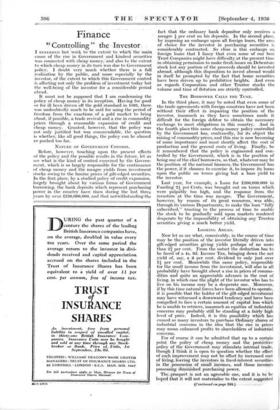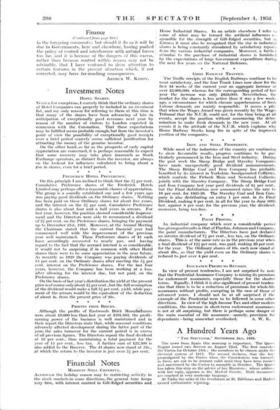‘C
- Controlling 5
g the Investor,
Finance
I REFERRED last 'week to—the extent to which-the -main cause of the rise in Government and kindred securities was connected with cheap-Money,'and also to the extent to which cheap money in its turn was due to Government policy. I doubt very much whether there is a full realisation by the public, and more especially by the investor, of the-extent to 'which this-Government control is affecting not only the problem of investment today but the well-being of the investor for a considerable period ahead.
It must not be supposed that 'I _am condemning the policy of cheap money in its inception. Having for good or for ill been driven off the gold standard in 1931, there was undoubtedly much to be said for using the period of freedom from the exactions of a gold market to bring about, if possible, a trade revival and arise in commodity prices through a reasonable expansion of credit and cheap money. Granted,- however, that the policy was not only justified but was commendable, the question is whether, like all goOd things, the policy can be abused or pushed too far.
NATURE OF GOVERNMENT CONTROL.
Before, however, touching upon the present effects of the policy and the possible, results in the future, let us- see what is the kind of control exercised by the Govern- ment, which is so largely responsible for the continuance of cheap money and the meagre yields from investment stocks owing to the famine prices of gilt-edged securities. In the first place, by a studied policy of credit expansion, largely brought about by various forms of Government borrowing, the bank deposits which represent purchasing power in the country have risen during the last three years by over £250,000,000, and that notwithstanding the fact that the ordinary bank depositor only receives a meagre per cent on his deposits. In the second place, by imposing an embargo upon all foreign loans, the area of choice for the investor in purchasing securities is considerably contracted. So close- is this embargo on foreign loans that I fancy that even some of our best Trust Companies might have difficulty* the present time in obtaining permission to make fresh issues on Debenture stock lest any portion of the proceeds should be invested abroad, although this disposition to invest abroad would in itself be prompted by the fact that home securities have been driven up to prohibitive heights. And even as regards Corporation and other Trustee stocks the volume and time of flotation are strictly controlled.
THE BORROWER CALLS THE TUNE. •
In the third place, it may be noted that even some of the trade agreements with foreign countries have not been without their effect in impairing the position of the investor, inasmuch as they have sometimes made it difficult for the foreign debtor to obtain the necessary exchange to meet obligations in this country. And in the fourth place this same cheap-money policy controlled by the Government has, confessedly, for its object the raising of commodity prices, and this rise is now becoming of some importance and must shortly affect the cost of production and the general costs of living. Finally, be it remembered that the policy is engineered and con- trolled by the Government, which is in the position of being one of the chief borrowers, so that, whatever may be the position of the national finances, the Government has the power, if it chooses to exercise it, to impose its loans upon the public on terms giving but a bare yield to the investor.
Last year, for example, a Loan for £200,000,000 in Funding 2i per Cents. was brought out on terms which were palpably too high, and the response from the investors at the time was meagre. The Government, howeVei:, by reason of its great resources, was able, through its various bepartments, to make the loan "fully subscribed," trusting to the process of time to enable the stock to be gradually sold upon markets rendered desperate by the impossibility of obtaining any Trustee securities giving a much better yield.
LOOKING AHEAD.
Now let us see what, conceivably, in the course of time may be the. position of the investor literally driven into gilt-edged securities giving yields perhaps of no more than 21 per cent. From the outset the deduction has to be faced of a 4s. 9d. Income Tax, bringing down the net yield of, say, a 8 per cent. dividend to only just over 2i per 'cent. Meanwhile this same policy, responsible for the small income from the investment, will also in all probability have brought about a rise in prices of commo- dities and quite an appreciable advance in the cost of living, in which case the plight of the investor who has to live on his income may be a desperate one. Moreover, if by this time natural forces have been allowed to operate, it is possible that the holder of the gilt-edged investment may have witnessed a downward tendency and have been compelled to face a certain amount, of capital loss which he is unable to retrieve, inasmuch as equities of industrial concerns may probably still be standing at a fairly -high level 'of price.' Indeed, it is this possibility which has caused so many investors to purchase Ordinary shares of industrial concerns in the idea that the rise in prices may mean enhanced profits to shareholders of industrial concerns.
For of course it can be admitted that up to a certain point the policy of cheap money and the protective policy of the Government may stimulate internal, trade, though I 'think it is open to question whether the effect of such improvement may not be offset by increased cost of living, leaving the investors in fixed-interest securities in the possession. of small incomes, and those incomes possessing diminished purchasing power. . The_pinspect is not an agreeable one, and it is to be hoped that it will not materialise to the extent suggested (Continued on page 398.1
Finance
(Cantinue.d from page 390.1 in the foregoing comments; bUt shOOld it do so it will be due to Governments, here and elsewhere, having pushed the policy of control and interference with natural forces too far, and it is because of the dangers of this excess, rather than because control within reason may not be advisable, that. I hare ventured to draw attention to certain features in the present situation which, if not corrected, may have far-reaching consequences.
ARTHUR W. KIDDY.







































 Previous page
Previous page